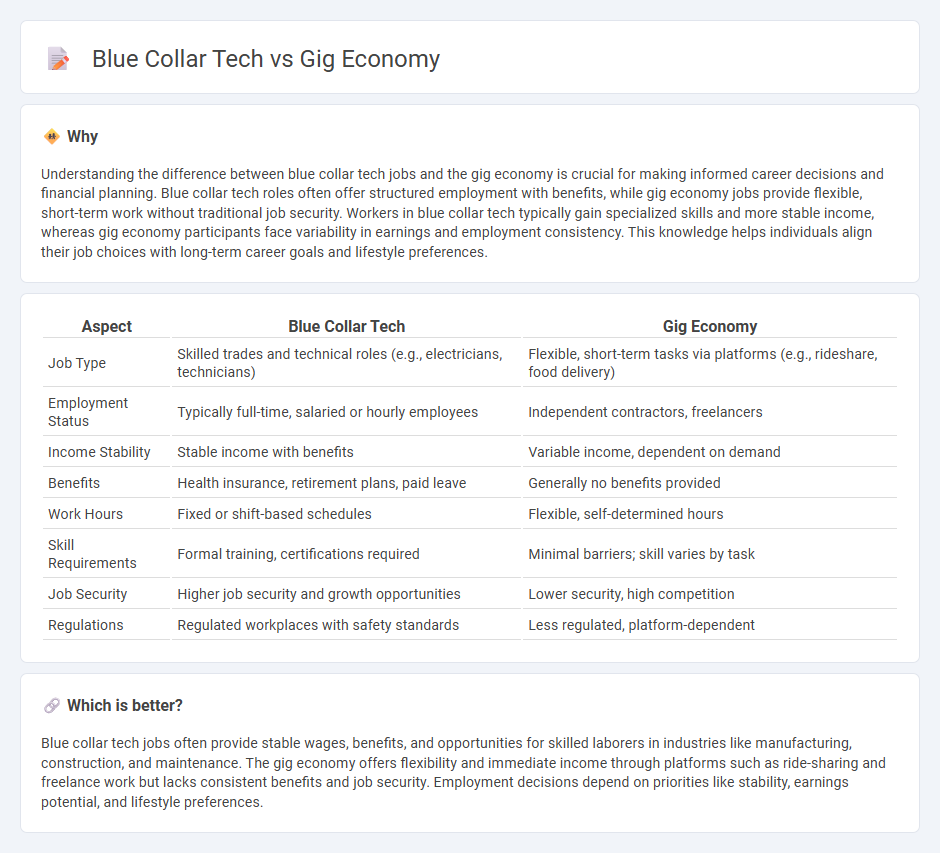
Blue collar tech jobs encompass skilled labor roles in industries like manufacturing, construction, and maintenance, leveraging specialized technical training and hands-on expertise. The gig economy offers flexible, short-term employment opportunities, often facilitated through digital platforms, allowing workers to perform diverse tasks on demand. Explore how these evolving employment models impact job security, income stability, and career growth.
Why it is important
Understanding the difference between blue collar tech jobs and the gig economy is crucial for making informed career decisions and financial planning. Blue collar tech roles often offer structured employment with benefits, while gig economy jobs provide flexible, short-term work without traditional job security. Workers in blue collar tech typically gain specialized skills and more stable income, whereas gig economy participants face variability in earnings and employment consistency. This knowledge helps individuals align their job choices with long-term career goals and lifestyle preferences.
Comparison Table
| Aspect | Blue Collar Tech | Gig Economy |
|---|---|---|
| Job Type | Skilled trades and technical roles (e.g., electricians, technicians) | Flexible, short-term tasks via platforms (e.g., rideshare, food delivery) |
| Employment Status | Typically full-time, salaried or hourly employees | Independent contractors, freelancers |
| Income Stability | Stable income with benefits | Variable income, dependent on demand |
| Benefits | Health insurance, retirement plans, paid leave | Generally no benefits provided |
| Work Hours | Fixed or shift-based schedules | Flexible, self-determined hours |
| Skill Requirements | Formal training, certifications required | Minimal barriers; skill varies by task |
| Job Security | Higher job security and growth opportunities | Lower security, high competition |
| Regulations | Regulated workplaces with safety standards | Less regulated, platform-dependent |
Which is better?
Blue collar tech jobs often provide stable wages, benefits, and opportunities for skilled laborers in industries like manufacturing, construction, and maintenance. The gig economy offers flexibility and immediate income through platforms such as ride-sharing and freelance work but lacks consistent benefits and job security. Employment decisions depend on priorities like stability, earnings potential, and lifestyle preferences.
Connection
Blue collar tech roles often intersect with the gig economy by leveraging digital platforms that connect skilled tradespeople with on-demand job opportunities, enhancing flexibility and income potential. Mobile apps and online marketplaces facilitate real-time matching of workers to short-term projects in construction, maintenance, and manufacturing sectors, expanding access to diverse gig work. This integration fosters a hybrid labor market where traditional manual skills are increasingly monetized through technology-driven gig platforms.
Key Terms
Flexibility
Flexibility in the gig economy offers workers the ability to set their own schedules and choose projects, enabling greater work-life balance compared to traditional blue-collar tech jobs that often require fixed shifts and on-site presence. Blue-collar tech positions typically provide more job security and consistent income but limit the freedom to adjust work hours spontaneously. Explore deeper insights into how flexibility impacts job satisfaction and career growth across these two labor segments.
Skill specialization
Skill specialization in the gig economy emphasizes versatile, task-based abilities adaptable to diverse short-term projects, often leveraging digital platforms for flexible work arrangements. In contrast, blue collar tech roles demand deep expertise in specific technical skills such as HVAC repair, welding, or machinery maintenance, requiring formal training and certifications for hands-on proficiency. Explore further to understand how skill specialization shapes career paths and economic opportunities in both sectors.
Job security
Job security in the gig economy remains unstable due to irregular income and lack of employee benefits compared to blue collar tech roles, which often provide steady wages, unions, and stronger protections. Blue collar tech positions involve specialized skills in areas like manufacturing automation and equipment maintenance, offering more predictable career paths. Discover more about how evolving labor markets impact job security and worker rights.
Source and External Links
Gig Economy - Overview, Advantages, Disadvantages - The gig economy is a flexible labor market where companies hire independent contractors and freelancers for short-term jobs through digital platforms, offering cost-effective, efficient services and increasingly popular among younger workers, with about one-third of the U.S. population participating in some capacity.
The Pros and Cons of the Gig Economy - This economy model allows individuals to work on short-term gigs instead of full-time jobs, connecting workers and businesses through digital platforms and reshaping the labor market with an estimated 70.4 million Americans freelancing and a projected global market growth to $2.15 trillion by 2033.
What is the Gig Economy? - Defined as a system where temporary positions are common and organizations hire independent workers for specific projects, enabled by digital technology and increased workforce mobility, allowing global talent hiring and flexible work locations beyond traditional employment ties.
 dowidth.com
dowidth.com